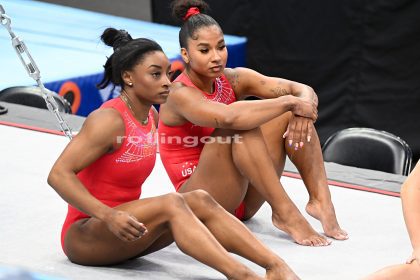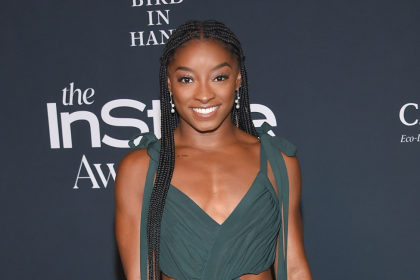Olympic gold medalist Simone Biles, celebrated for her record-breaking gymnastics career and advocacy work, is now facing an entirely different kind of challenge—misinformation. In recent weeks, a fabricated story claiming Biles benefited from a student loan forgiveness program has gone viral, prompting a wave of online criticism steeped in misinformation and racial bias.
While Biles has proven herself a champion in the gymnastics arena, this incident underscores the challenges of being in the public eye, where even baseless rumors can spiral into widespread backlash.
the origins of the false claim
The misinformation began circulating on social media when a viral tweet alleged that Biles received $44,000 in student loan forgiveness. The post cited a fabricated statement reportedly made by actress Roseanne Barr, which originated on a little-known gossip site in August. Despite the lack of credible sources or evidence, the claim spread rapidly, fueled by speculation and outrage.
As the tweet gained traction, users across social media platforms criticized Biles, with many questioning why a high-profile athlete with an estimated net worth of $20 million would need student loan forgiveness. The claim, entirely unfounded, reflects the power of viral misinformation to distort public perception.
Racist undertones fuel the backlash
The misinformation campaign against Biles quickly took an ugly turn, with racial undertones becoming evident in the online discourse. Critics used the false claim to question whether student loan forgiveness disproportionately benefits Black and Brown students, veering the conversation into racially charged territory.
Some social media users falsely attributed Biles’s success to her race, using the fabricated loan forgiveness story to stoke broader stereotypes about financial aid and fairness. These comments highlight the persistent racial biases that often surface in conversations about wealth, privilege, and success in America.
Separating fact from fiction
Despite the widespread speculation, the facts of Simone Biles’s education and finances debunk the false claims entirely. Biles did not attend a traditional university that charges tuition or offers federal financial aid. Instead, she enrolled at the University of the People, an accredited online institution that provides tuition-free programs. The flexibility of this program allowed Biles to pursue her education while continuing her demanding gymnastics career.
Importantly, the University of the People does not participate in federal student loan programs, meaning Biles could not have incurred—or had forgiven—any student loan debt.
Furthermore, Biles’s financial status firmly places her outside the eligibility criteria for student loan forgiveness programs. With an estimated net worth of $20 million, built through years of hard work, Olympic victories, and endorsement deals, it’s clear she has no need for financial assistance of this nature.
Fans and advocates speak out
As the false narrative spread, Biles’s fans and supporters quickly stepped up to defend her. Many pointed out the inaccuracies of the claims, calling attention to her integrity and achievements.
One user wrote, “Simone didn’t attend a traditional college, and she wouldn’t need student loan forgiveness anyway. These rumors are just fake news.” Others emphasized the disparity in scrutiny between Biles and other public figures embroiled in legitimate financial scandals, highlighting the racial double standards in how such cases are treated.
Comparisons to other controversies
The backlash against Biles has drawn comparisons to controversies involving other high-profile figures, such as former NFL quarterback Brett Favre. Favre faced serious allegations of misappropriating welfare funds in Mississippi, yet the media and public reaction to his scandal was far less intense than the scrutiny Biles is enduring over a fabricated claim.
This disparity highlights a troubling pattern in media narratives, where Black and Brown public figures often face harsher criticism and judgment than their white counterparts, even in cases where the accusations are baseless.
Biles responds to the rumors
Amid the growing controversy, Simone Biles addressed the misinformation directly, using her social media platform to set the record straight. In a straightforward tweet, she wrote, “Y’all really need to stop believing everything you read on the internet.”
Her response not only dismissed the claims but also served as a broader warning about the dangers of misinformation in the digital age. Biles’s ability to address the issue with poise and clarity reflects her maturity and strength, even in the face of unwarranted criticism.
The power and danger of misinformation
The Simone Biles student loan forgiveness controversy serves as a stark reminder of how misinformation can spread rapidly and cause real harm, even when the claims are easily disproven. In an era where social media dominates public discourse, false narratives can gain traction within hours, often leaving their targets to deal with the fallout.
For Biles, the incident highlights the unique challenges faced by public figures, particularly women of color, who often endure disproportionate scrutiny and judgment. These challenges are compounded by the racial biases that persist in conversations about privilege, wealth, and success.
Simone Biles’s story should remind us of the importance of seeking out accurate information and questioning the validity of what we see online. As discussions about student loan forgiveness and financial equity continue, it’s crucial to separate fact from fiction and engage in conversations rooted in truth.
Biles’s rise to success is a testament to her hard work, dedication, and unmatched talent. It’s unfortunate that false claims and racial bias have momentarily overshadowed her achievements. However, her ability to respond with grace and clarity demonstrates her resilience and serves as an example for others facing similar challenges.
As a society, we must do better—both in how we consume information and how we treat those in the public eye. By prioritizing truth and holding ourselves accountable for the narratives we spread, we can foster a more informed and equitable dialogue that uplifts, rather than tears down, those who inspire us.












